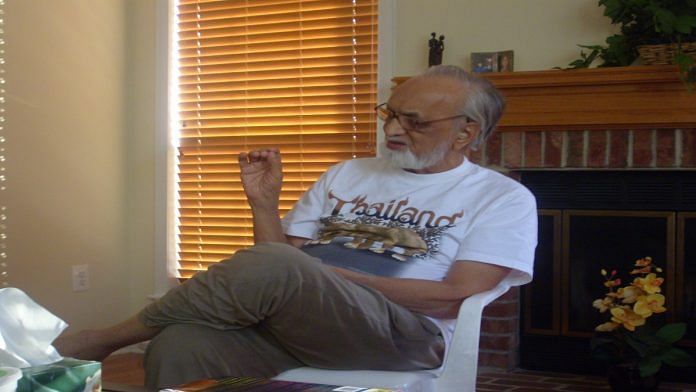New Delhi: For Vijay Tendulkar, the theatre thespian from Maharashtra born 19 years before Independence, taboos were meant to be broken.
In 1981, when the world was yet to come to terms with homosexuality, his play Mitrachi Goshta (A Friend’s Story) explored a lesbian love story based in the pre-Independence era. His 1955 play Shrimant (The Rich) centred on a single mother.
The celebrated playwright and social commentator often touched upon difficult, poignant issues. Director Govind Nihalani’s debut movie Aakrosh, which Tendulkar wrote, is the painful account of a family destroyed by a corruptible justice system.
Counted among India’s greatest playwrights and dramatists ever, Tendulkar started his career as a journalist before building an enviable repertoire that tapped the raw, real and harsh complexities of life.
No wonder then that a fresh production of Mitrachi Goshta is said to be staged in Delhi later this month.
Over a career spanning four decades, Tendulkar wrote 28 full-length plays, four collections of short stories, and 19 film scripts. The fact that he primarily wrote in Marathi didn’t keep him from developing a fanbase around the country and the world.
As The New York Times noted in an obituary for Tendulkar, “It was a measure of Mr. Tendulkar’s gifts that he achieved worldwide fame despite writing in Marathi, the language of his home state, Maharashtra, in west central India. Most of his plays were translated into Hindi and English for national and international audiences.”
The playwright who won the Sahitya Akademi Award in 1965 passed away on 19 May 2008. On his 11th death anniversary, ThePrint remembers the literary titan.
Passion for theatre
Tendulkar was born on 6 January 1928 in what was then Bombay Presidency. His interaction with plays started early as his father, who managed a small publishing house, was also a playwright and theatre artiste.
Already an avid writer in his childhood, Tendulkar is said to have written, directed and acted in his first play by age 11. He spent his childhood in three different cities in modern-day Maharashtra —Bombay, Pune and Kolhapur—and grew up as a voracious reader who loved to watch English movies.
His professional career started with a stint in the press—after briefly working in a printing press, when he joined the daily Navbharat.
In 1955, he wrote his first play Grihasti (household), followed by the groundbreaking Shrimant the following year.
But it was his subsequent plays, including Shantata! Court Chalu Aahe (Silence! The Court is in Session, 1967), Sakharam Binder (1972), and Ghasiram Kotwal (1972), that cemented his position as a powerhouse of Marathi theatre.
The themes of his plays often made people uncomfortable, but they were still staged across India.
Shantata! Court Chalu Ahe, inspired by real life events, was essentially a play within a play, and sought to highlight male chauvinism with its depiction of male members of a play’s crew attacking the dignity of a female colleague.
Sakharam Binder dwelt on sex, and the violence men and women subject each other to.
Ghashiram Kotwal, set in the 18th century, showed the end of the Peshwa rule in Pune, with Nana Phadnavis, the ruler of the Peshwas, depicted as a womaniser who exploited his powers. Tendulkar once described the play as a reaction to the rise of the Shiv Sena, which was formed in 1966 as a platform to tap into Marathi pride.
“The impulse to write the play was provoked by the contemporary political situation of the time, specifically the rise to power of the Shiv Sena in Maharashtra,” he said.
Despite the play running into trouble with the party, it was reportedly performed 290 times in Mumbai theatres alone.
The contours of society and its challenges were a recurring theme in Tendulkar’s writings, and, in 1981, he tapped an expose conducted by a journalist of The Indian Express to pen Kamala, which dealt with sex trafficking.
Also read: Mrinal Sen, the cinematic genius who had the courage to bring social realities on celluloid
Brush with films
When he did have his foray into films, it was seldom for commercial ones, with Tendulkar generally teaming up with the luminaries of Indian arthouse cinema, like Shyam Benegal, Govind Nihalini, and Jabbar Patel.
His collaborations with Benegal – Nishant (1975) and Manthan (1976) – were widely appreciated, with the latter even winning the National Film Award for Best Feature Film as well as for Tendukar’s screenplay. For Nihalini, Tendulkar wrote Aakrosh (1980), Ardha Satya (1983) and Aghaat (1985).
With Jabbar Patel, the association centred on Marathi films, including Saamna (1974) and Umbartha (1982).
Also read: Saadat Hasan Manto, lover of fountain pens, shoes & alcohol, who was the voice of Partition
Awards and legacy
Tendulkar won a string of awards and recognitions through his life, including the Padma Bhushan in 1984 and the Maharashtra Gaurav Puraskar Award in 1990.
His personal life is said to have left him a shattered man in his last years, with the death of his daughter, the famous TV actress Priya Tendulkar, in 2002 affecting him particularly deeply. Just a year earlier, he had lost his wife Nirmala and cinematographer son Raju.
He passed away in 2008, aged 80, in Pune after succumbing to a relatively rare autoimmune disease called myasthenia gravis. His writings, however, continue to live on.



